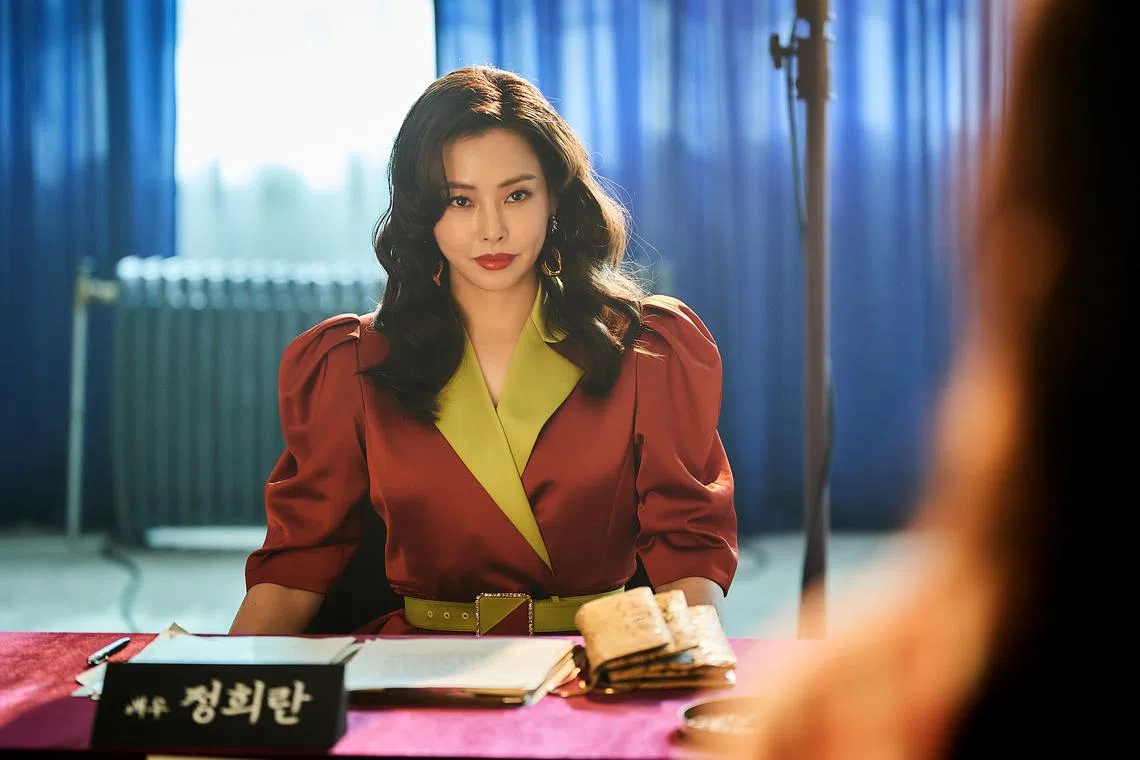Actress Lee Ha-nee unpacks sex and power in South Korea’s film industry in Netflix K-drama Aema
Sign up now: Get ST's newsletters delivered to your inbox

Lee Ha-nee in Aema.
PHOTO: NETFLIX
SEOUL – The South Korean series Aema is unapologetically provocative – revisiting Korea’s most popular erotic film Madame Aema (1982), while splicing in pointed references to real-life figures, including former President Chun Doo-hwan, to expose the sexual exploitation and abuse of power that plagued the country’s film industry in the 1980s.
Now available on Netflix, the period K-drama tackles sensitive material head-on, from casting couch to late-night “banquet halls” where actresses were expected to play hostesses for politicians.
South Korean actress Lee Ha-nee, who stars as Hee-ran in the show – an A-list star who refuses to appear nude in an erotic production and loses her role to rising talent Joo-ae (Bang Hyo-rin) – was frank about the challenges of navigating such combustible material.
“Rather than literally recreating or reproducing reality, I thought Aema satirised certain moods or atmospheres of the 1980s. At times, it may feel a bit uncomfortable because it’s portrayed so directly, but in the case of the banquet hall scene... I interpreted it as being simultaneously very realistic in some aspects, and very dramatic and fantastical in others. Still, I think such a scene was necessary,” said the 42-year-old also known as Honey Lee, who gave birth to her second daughter in August.
The Miss Universe Korea 2007 winner and her Korean-American husband also have a three-year-old girl.

Actress Lee Ha-nee at a press event for her new drama Aema.
PHOTO: HONEY_LEE32/INSTAGRAM
It is that blend of rawness and theatricality, she added, that makes the episode such a pivotal hinge in the narrative.
“For Aema, (the banquet hall scene) was a very significant piece of work. For me as well, it wasn’t so much a burden as it was a crucial period that I approached with a sense of importance while filming.”
Lee underscored the show’s central theme of resistance, adding that while Aema is rooted in a distinctly Korean history, it carries universal resonance.
“I think there are still issues out there that require someone to speak up with courage. So, even though this is really just a drama, if it connects with people who recognise our history of struggle and see themselves as part of that ongoing legacy, I believe viewers around the world will watch it, enjoy it and relate to it,” she said.
On a personal level, the 16-year screen veteran admitted she saw parts of herself in Hee-ran’s fraught relationship with Joo-ae, acknowledging the push-and-pull between generations.

Lee Ha-nee (left) and Bang Hyo-rin, who plays Joo-ae in Aema.
PHOTO: NETFLIX
“Honestly, there are so many younger actors these days who are just incredibly talented. So, yes, I can definitely understand Hee-ran’s feelings when she looks at Joo-ae,” she said.
“But for me, more than dwelling on that kind of insecurity, what really matters is asking myself: How can I act with more seriousness, more depth, without letting go of that commitment?”
Rather than taking her longevity for granted, Lee – who won the Baeksang Arts Award for Best Actress for period drama Knight Flower (2024) – said she approaches every new project with a sense of urgency and gratitude.
“These days, it’s no longer the case that female stars have to retire just because they have children. But still, I personally approach each project as if it might be my last. Life is unpredictable, and so many variables can come up that prevent you from taking on the next role. I’ve even seen it happen to people close to me. That’s why I treat every single project as precious, as if it might be my final one.”
Asked how she might have navigated the industry in the 1980s herself, Lee replied: “I think I would have been more sharp-edged. The 1980s were really the era of erotic films, and I often thought about how exhausting it must have been to live as an actress during that time.
“While researching and watching many works in preparation for Aema, I kept feeling that the senior female stars who acted purely out of love for the craft must have gone through incredible hardships. I imagine many of them must have even thought about retiring – not just because of the heavy social pressures, but because of how drained and consumed they must have felt personally.” THE KOREA HERALD/ASIA NEWS NETWORK
Aema is available on Netflix.


